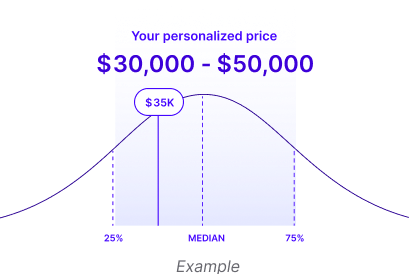Prevalent
Fast, fair, easy pricing. No sales call required.
Prevalent
|Visit prevalent.net
How much does Prevalent cost?
When negotiating with Prevalent, it is critical to emphasize their importance in third-party risk management and how their services can substantially benefit your organization. Given their leadership position in the market, they may be open to price adjustments, especially if you can present competitive alternatives or descriptions of your needs that could lead to a partnership.Given that Prevalent has a variety of prominent clients, leveraging your status or potential to be a long-term customer could also provide you with leverage in negotiations. Focus on articulating how your organization can help validate their offerings through your business case, potentially leading to a more favorable deal.Lastly, with an average contract value of approximately $25,873.11 and a total proposed price of $159,090.41, ensuring the negotiations reflect a scale that matches your organization's purchasing power can be beneficial. Discuss the possibility of securing additional savings or value through bundled services or extended contracts.
See detailed pricing for your specific purchase
AI Quote Analysis
Upload your quote to check if you’re getting a fair price, under 2 minutes and completely free.

How does Prevalent price and package their products?
View pricing on Prevalent's website
Product:
N/A
Not availablePayment Terms: N/APopular Features: Leader in third-party risk management and cyber threat intelligence.
Negotiating with Prevalent
Negotiation Tips
In negotiations with Prevalent, emphasizing the necessity to remove auto-renewal can provide significant leverage as it allows for flexibility when your contract is nearing renewal. Engage your finance team to ensure clarity on this requirement, since many companies can only proceed without auto-renew terms. This tactic can prevent unexpected costs associated with automatic renewals.
Bring competitive bids to the negotiation table as significant leverage. Present the pricing models offered by similar risk management platforms, highlighting the cost-benefit analysis. This will show Prevalent that there are alternatives, potentially leading them to offer a more attractive pricing structure or additional features.
During your negotiations with Prevalent, push to waive potential overage fees, especially if your usage or vendor assessment requirements tend to increase. Leverage any underutilization in your current contract to negotiate the removal of these fees in exchange for committing to wider usage or multi-year agreements.
Whenever Prevalent proposes an uplift during renewal discussions, highlight budgeting constraints and anchor the conversation around a flat renewal price. Emphasize that most vendors reward price stability through their offerings and using data from your previous agreement as reference can strengthen the case for eliminating uplifts.
Propose to become a reference for Prevalent or participate in case studies conditional on them agreeing to lower rates or better contract terms. This not only berths goodwill, but can also yield financial benefits as they seek promotional leverage from notable partnerships.
Considerations when buying Prevalent
OwnershipPrivate
Fiscal year endDecember
Best months to buyJanuary, July, December
Payment TermsNet 30, Annual payment upfront, Quarterly payment options available
Upgrades/downgradesPrevalent only offers upgrades for its services.
Redline thresholdRedline threshold estimate is $50k.
Vendr community insights for Prevalent
What real buyers recommend in the negotiation process
Company with 201-1000 employeesThis year
Prevalent was attempting to enforce a 5% uplift upon renewal despite the quantity remaining the same. We were able to counter this by focusing on budget constraints as well as offering to do another 3 year term.Additional Info
What is Prevalent?
Leader in third-party risk management and cyber threat intelligence.Prevalent's 1 Product
Prevalent
Leader in third-party risk management and cyber threat intelligence.News that may impact Prevalent pricing or negotiations
PR Newswire
360factors™ and Prevalent™ Announce PartnershipAugust 12, 2024PR Newswire
Prevalent Achieves Record-Setting Third-Party Risk Management Growth in First Half of 2024July 10, 2024PR Newswire
Prevalent Unveils New AI-Powered Enhancements to its Third-Party Risk Management Platform, Designed to Reduce Risk Assessment Time and Simplify Platform Navigation, Threat DetectionJune 12, 2024